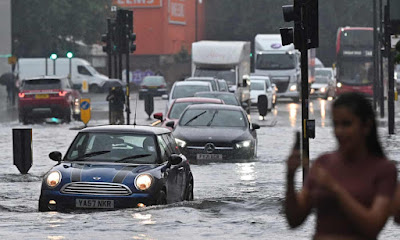Flash Floods in London???
One thing that still amazes me when these climate emergency events occur is how easily our resilience is overwhelmed.
Next week the Intergovernmental Panel on Climate Change will release its long awaited sixth assessment report on adaptation, what nations must do to cope with climate breakdown now and in the near future. The title, "Impacts, Adaptation and Vulnerability" provides a pretty good idea of what's coming.
Britain's largest city, its capital, is getting a crash course in vulnerability caused by its Victorian-era drainage system.
There is now a significant risk of people drowning in London as the threat of major flash floods increases in the city because of climate change. According to a report by a London Councils taskforce published this month, the danger is particularly severe because there is no overall plan or authority to tackle the increasing threat of flooding in the city.In its analysis of the citywide disruption that struck last July, when torrential rain swept across London on several occasions, the group says that more than a month’s average rain fell on the city in an hour on several different days. For example 48.5mm of rain fell on Shepherd’s Bush in an hour on 12 July while its average rainfall for that month is 46.8mm.
Across London, tube stations were flooded, hospitals closed, and more than 1,000 homes inundated. As deluges become more frequent as global warming takes hold, there is now a real risk that London could see far greater increases in devastation from surface water flooding.
The report issued a blunt warning.
The report also warned that “London has an increasing area of impermeable surfacing and still essentially relies on a Victorian drainage system that was not designed to cope with the city’s current and predicted future populations.” It highlighted the fact there was no single organisation in charge of tackling surface water flooding in London; there was insufficient funding to manage the risk, and a lack of understanding of the risks posed by surface water flooding. Major improvements in all these areas were urgently needed if the city is to cope with future serious inundations.
This does seem to echo the "collective helplessness" theme of last week's Munich Security Conference. The MSC report warned that entire societies could be overwhelmed by a sense that there are no answers to immediate challenges. This, in turn, can erode liberal democracy and pave the way for authoritarianism.


Comments
Post a Comment